-
-
Key features
-
© 2025 Copyright Planning Pod. All Rights Reserved.





Centralize event booking details and simplify collaboration with a powerful, custom toolset
Our restaurant catering software has 40+ online tools that are dialed in to track and grow your private events business.

Our tools streamline every step of event management, from bookings and setups to food orders, saving time across front-of-house and kitchen operations.


Learn why 70,000+ hospitality and event professionals rely on our software solution to streamline their events
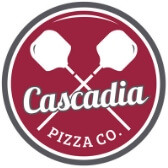



Discover why restaurants and bars choose
Planning Pod to boost event sales and save time
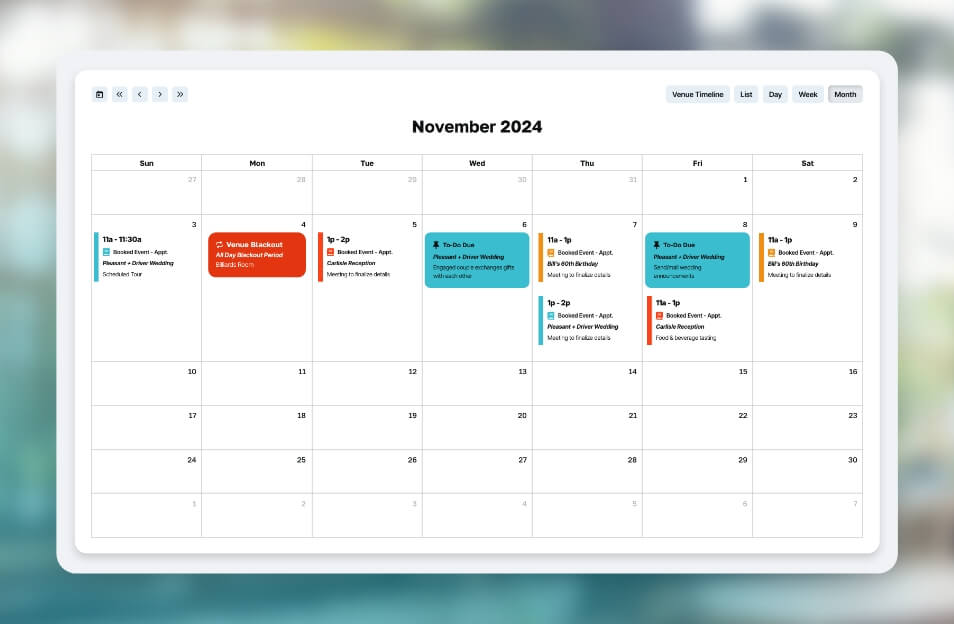
Instantly know room availability, automate bookings, and avoid double-booking with our event booking software. Shareable, color-coded calendars help you and your team manage events, reservations, and appointments, with syncing options for Google, Outlook, and more. Features like "event mode," "room mode," and real-time availability calendars for your website ensure seamless scheduling and visibility.
Our web-based restaurant event software keeps your entire team—event managers, chefs, servers, and more—aligned and connected. Centralize event-related emails, simplify client interactions through an online portal, and streamline tasks with reminders, notifications, and file sharing. Manage user access, track progress with dashboards, and generate flexible reports to ensure smooth communication and organization.
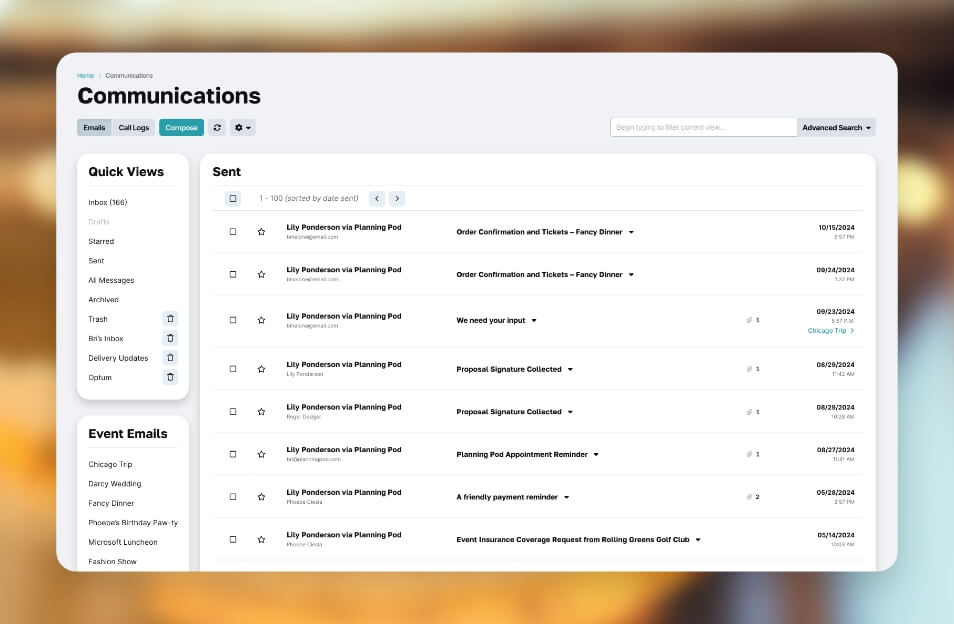
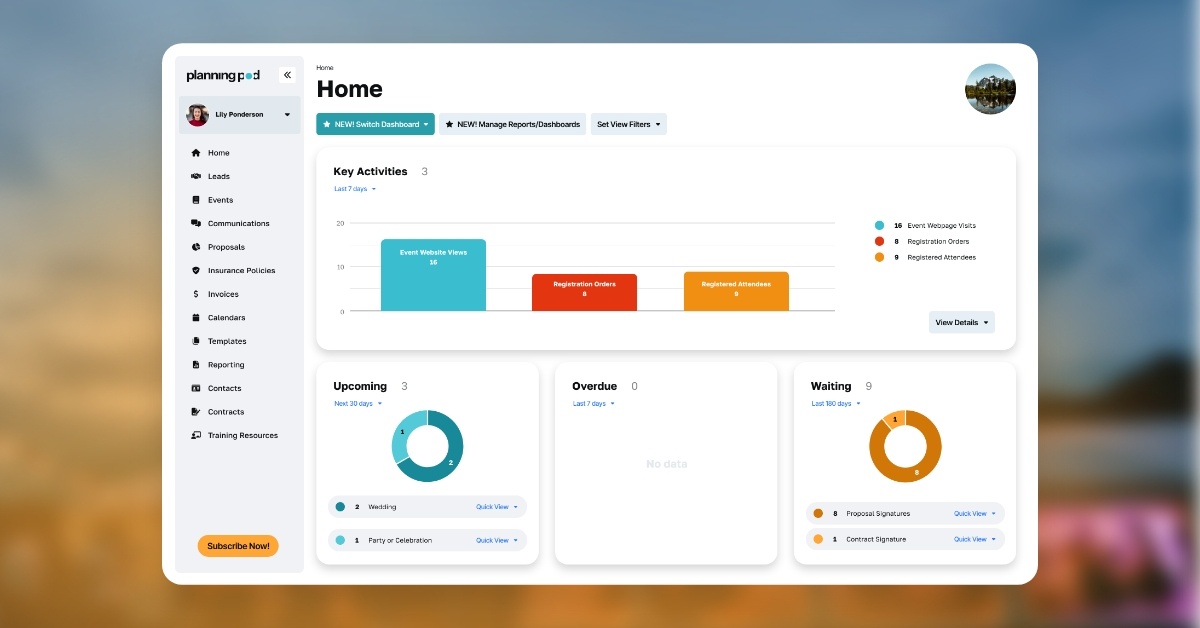
Our all-in-one restaurant event management software streamlines every detail of your events, from timelines and budgets to headcounts and floor plans. Easily track and bill food-and-beverage orders, create custom menu templates with pricing and portion sizes, and generate BEOs and menus instantly. Impress clients and guide staff with detailed floor plans showcasing table, chair, and equipment arrangements—all in one organized platform.
Our comprehensive event CRM tool streamlines every aspect of customer, lead, and event management. Capture leads with webforms, track them through your sales pipeline, and create branded documents, colorful proposals, and contracts with e-signatures. Simplify billing with detailed invoices, online payment processing, POS integration, and automated reminders for installment payments—all in one powerful system.
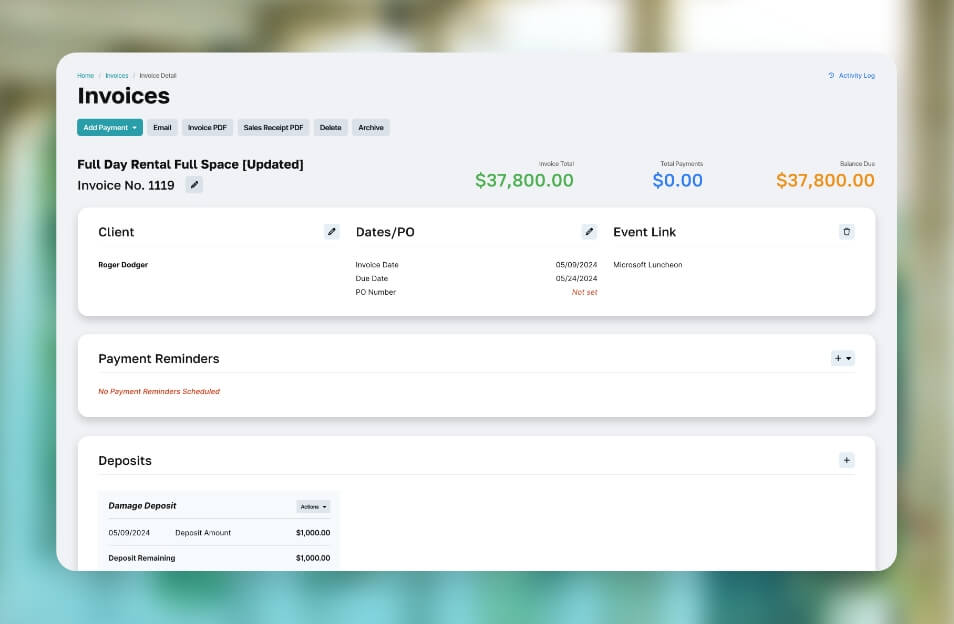
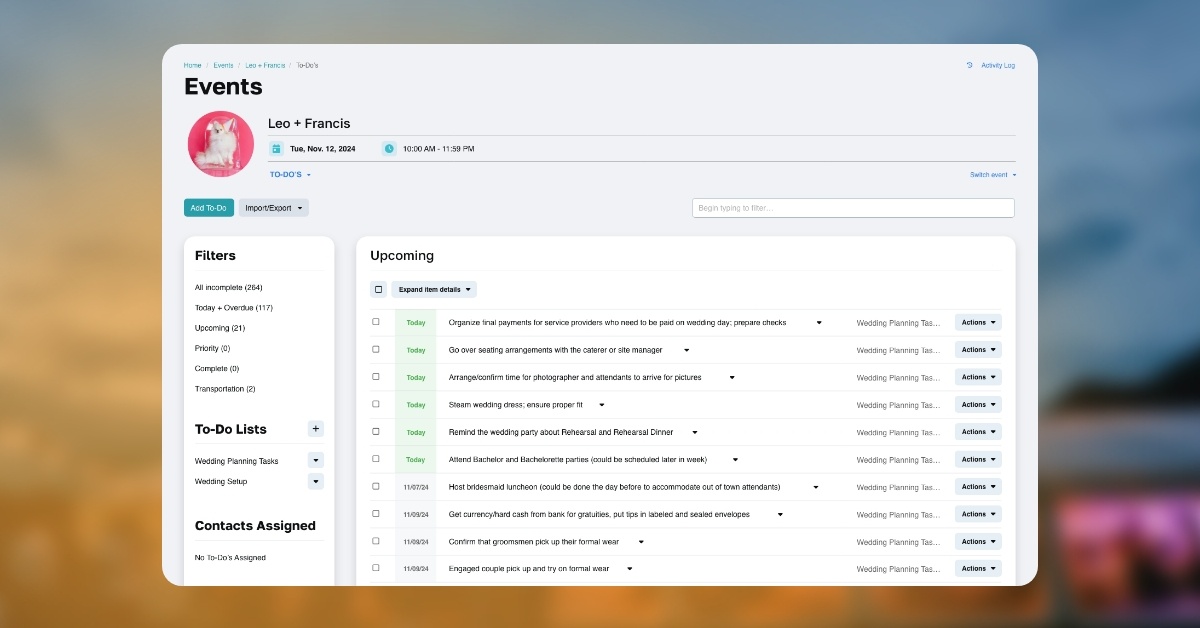
Our restaurant event management software simplifies your workflow with user-friendly tools accessible from any device. Featuring an intuitive interface, high-touch support, and seamless integration with apps like QuickBooks, Salesforce, and Google Drive via Zapier, it gets you up and running fast.

Any experienced restaurateur or hospitality expert knows that there are two sides to running a successful joint: your regular reservation/foot-traffic patrons and your special event or private event sales. And with average annual profits for restaurants running somewhere around 5%, you have to maximize profits from both these revenue streams in order to stay in the black for the year.
One great way to create efficiencies and boost your productivity is to employ technology to help you and your team save time and streamline your processes. Most establishments have installed restaurant POS systems like Toast POS, Square POS, Heartland POS, Aloha, Clover, Aldelo, Breadcrumb, TouchBistro or Revel prior to opening their doors, while others also employ restaurant reservation systems like OpenTable, Eveve and Yelp Reservations to boost reservation bookings.
However, more than a few dining establishments still use spreadsheets and pad-and-pen to manage the booking process for their private dining and group sales business, which can limit your capacity and result in missed opportunities and lost data simply because nothing is automated, there is no centralized place to store or access information, and there is no "safety net" (like backups, reminders, notifications, etc.) in case something goes wrong.
There are many choices available to event professionals when it comes to a restaurant event sales software solution, and fortunately many of the available options work well whether you run an independent restaurant, a multi-location restaurant chain/franchise, a restaurant located in a hotel or B&B or are opening a new event space for private events that are catered. In addition, many platforms like Planning Pod and Tripleseat are also suited for managing on-premise private group dining as well as off-premise catering.
With that said, there are definitely key tools, features and functionality that you should look for when considering software to manage your banquet and events business ... Here are 12 of them.
Tracking your booked events and availability from a centralized event calendar is probably the biggest asset that an online event management solution can offer you. However, most restaurant event booking software tools don’t stop there and also provide the ability to track lead information (including potential dates and holds on dates or event spaces and rooms); to schedule appointments for client meetings, calls, walkthroughs, tastings and site visits; and to view bookings by room or space.
It’s assumed that you are probably already using an electronic calendar to track reservations or appointments, so it’s helpful if your private event calendar is syncable with other electronic calendars. It's also a big asset if your online event management platform can run reports based on booked dates to get a sense of your facility usage. Being able to duplicate events or add recurring events as well as quickly add new events is another helpful feature.
Instead of writing down all your customer’s requests on a notepad and then transcribing that to a spreadsheet or document, wouldn’t it be easier to just enter a new event into an online form or let customers do it online themselves ... and then have all that information populate into calendars, proposals, BEOs, etc., when you need it to? This is where restaurant catering software can start saving you loads of time.
For starters, it’s a huge asset to have an easy-to-access online platform for you and your staff to be able to enter, view and edit things like headcounts, rentals and equipment allocations, vendor and supplier assignments, event timelines, and setup and teardown instructions. But it's another thing to be able to build a library of your food-and-beverage items (complete with descriptions, images, recipes, unit pricing and portion sizes) as well as be able to build reusable food-&-beverage package templates from this library.
And it’s yet another to be able to take this information and create automations to generate things like banquet event orders to provide to staff members prior to events, or full-color, custom food-&-beverage package menus to show or send to clients. Also, if you are dependent on external vendors for particular deliverables or services, vendor management tools are very useful for tracking supplier orders and fulfillment.
The key to a successful private events business is to keep the pipeline full, and any decent restaurant event sales software solution gives you a suite of lead and marketing tools to help you convert prospects into customers. This starts with tools like website embed forms to collect leads from your site and put them into your pipeline so you can create tasks, manage communications and collect more information via online forms.
A comprehensive CRM tool for storing contact information for your leads and clients as well as for viewing past orders and communications is another great asset to have, as are event sales tools for building detailed proposals that you can send to your leads and electronic contracts for which you can collect signatures online. Some event venue management software platforms may also include email marketing tools for reaching out to your database as well as social media marketing tools for posting to your online profiles; however, apps like MailChimp and Hootsuite are also more than adequate for handling these functions.
Needless to say, none of this other stuff counts unless you get paid. So it’s vital that the system you choose offers user-friendly invoicing and payments tools that simplify how you bill your customer and accelerates how you receive payments during the entire event lifecycle.
Many companies in the hospitality sector bill in advance and in installments and require lots of custom elements, so you should look for restaurant event management software that lets you create invoices directly from proposals and track deposits plus gives you the ability to add unlimited line items and packages as well as taxes, markups, discounts, service fees, gratuities, delivery charges and setup/teardown fees.
In addition, it’s critical to have access to online credit card payment processing so you can receive invoice payments in expedited fashion, but just make sure that the merchant processor you use has security protocols in place and is PCI compliant.
Finally, a system that allows you to create automated workflows that align with how you do business will enable you and your team to adapt to the software faster and expedite processes.
As discussed before, it is highly unlikely any restaurant will be using a single, all-in-one restaurant software application for everything, as most hospitality venues typically use between 5 and 15 different applications, including restaurant point-of-sale software, reservation software, staff scheduling software, restaurant purchasing software and an inventory tracking application as well as accounting and marketing software tools.
Because of this, the restaurant event management software you choose should be able to integrate and share data with other applications (at the least your accounting and CRM applications if not your POS software). Some applications have direct integrations with other programs while others connect via an integration platform (called integration platforms-as-a-service or iPaaS) like Zapier or MuleSoft, allowing you to build workflows between systems.
Not only does your restaurant event management software need to make it easy to store and access information, but it also needs to deliver data to you in real-time in a compiled or overview fashion so you can see trends and quickly make well-informed decisions about your business.
Customizable reports can provide just this kind of business intelligence with compiled data on sales, revenues/profits, costs and facility usage for your various events that not only show past performance but allow you to make accurate forecasts. And overview dashboards can provide daily snapshots of where you stand with monthly revenues and open invoices as well as things like upcoming and overdue tasks.
Any busy event group sales and business development team is always sending out electronic documents like proposals, contracts, invoices and even BEOs for client review and approval. These documents are not only transactional but also are marketing opportunities where you have the opportunity to build your brand each time you reach out.
So these documents 1) need to be accurate and 2) need to look professional and convey your brand image in a memorable way. In addition, the system you use should allow you to email these documents from inside the system and also provide a history of when documents were sent as well as if there are different versions of such documents (like different versions of proposals).
Staying in touch with your team, clients, vendors and suppliers is critical in making sure there are no surprises in managing your events. But it’s also important to allow those people to communicate with each other and to keep a record of all those communications in case of confusion or misunderstandings.
Many event venue and restaurant catering systems include some type of event email software tool for managing email communications inside the application, and the best ones also offer integrations with platforms like Gmail or Outlook so you can use your existing email addresses to send/receive emails. Also, be aware that more and more platforms are integrating text messaging into their communications platform (as this is often a preferred mode of communication for many younger clients).
Having a clean, professional event floor plan diagram for each event can pay dividends for two reasons: 1) it will impress clients and show them exactly how their event will look, and 2) it lets you show your staff exactly what furniture and equipment needs to be set up and where. Some restaurant management software systems include space/room layout tools as part of the packages they offer, and these tend to be easy-to-use, drag-and-drop style tools where you can place elements like tables, chairs, walls, etc., into the layout.
Note that, if you offer event planning services to your clients, this tool can play a sizable role in your event planning processes by enabling you to easily communicate your vision to clients so they can provide appropriate feedback. Related functionality can include an assigned seating tool so you can create seating charts for events and easily direct attendees to their seats when they check in.
You should always make sure that whatever application you are considering provides help resources like a help portal and videos and email and/or phone support. In addition, some platforms also provide training (either included or for an additional fee), so make sure to inquire about this.
Most software applications have been moved online (and this includes most restaurant management software offerings), and for good reason (FYI ... these online software applications are often called software-as-a-service - or SaaS for short).
First, any updates that are made to the application are typically included in the price of the software (as opposed to software you have to install on your computer, which often charge for upgrades). Second, you don’t have to maintain the software on your machine. Third, your data is backed up in the cloud so you don’t have to worry about your hard drive crashing and losing all your data (although you should make sure that your provider has security measures in place to protect against data loss or breaches).
In addition, Web-based solutions like Planning Pod or Tripleseat are also more likely to be mobile-friendly and can be used on iPhones, iPads and Android devices as well as Macs and PCs, so if you and your staff tend to be on-the-go, this is a must-have option.
For some restaurants and banquet facilities, this may not be a requirement, but for those that plan and manage their own on-premise events for the public (either free or paid), having restaurant event management software that offers tools to market your events as well as collect event registrations and sell tickets online is a big plus in the in-house event planning process. Bonus features here include the ability to build event websites; create event registration forms with pricing and custom questions/surveys; send marketing emails to prospective attendees; and access to an event check-in app so you can scan attendees’ tickets at the door.
© 2025 Copyright Planning Pod. All Rights Reserved.